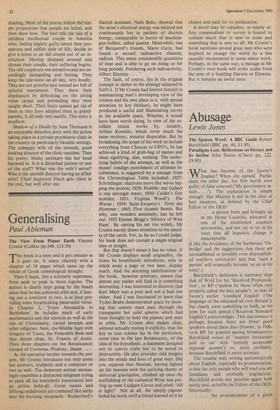Generalising
Paul Ableman
The View From Planet Earth Vincent Cronin (Collins pp.348, £12.50) This book is a mess and it gets messier as it goes on. It starts chastely with a chapter of 18 pages which sums up the whole of Greek cosmological thought.
Then it leaps, like a scholarly superman, from peak to peak in those regions. The author is clearly kept going by the heady sense that he has achieved orbit and, if leaving out a continent or two, is at least providing some breathtaking panoramic views. In Chapter 2, `From Alexandria to Bethlehem' he includes much of early mathematics and the sciences as well as the rise of Christianity, varied heresies and other religions. Next, the Middle Ages with Gregory of Tours, the Venerable Bede and that decent chap, St. Francis of Assisi. Then three chapters on the Renaissance; Gerard of Cremona, Ptolemy, Dante . . .
As the narrative lurches towards the present, Mr Cronin introduces not only poets but painters, sculptors and a composer or two as well. The desperate author increasingly resembles a distracted emigrant trying to pack all his household possessions into an airline hold-all. Great names and lifelong endeavours are crammed like socks into the bursting receptacle: 'Rutherford's Danish assistant, Niels Bohr, showed that the atom's electrical energy was emitted not continuously but in packets of discrete energy, comparable to bursts of machinegun bullets, called quanta. Meanwhile, one of Becquerel's friends, Marie Curie, had found a second radioactive element, radium. This emits considerable quantities of heat and is able to go on doing so for long periods. Pondering such radioactivity, Albert Einstein .
The fault, of course, lies in the original concept or rather in the strategy adopted to fulfil it. If Mr Cronin had limited himself to summarising man's developing view of the cosmos and his own place in it, with special attention to key thinkers, he might have produced a useful and illuminating survey in the available space. Whether it would have been worth doing, in view of the excellent extant works by, notably, Arthur Koestler, which cover much the same territory, remains disputable. But by broadening the scope of his work to include everything from Chaucer to UFO's, he has achieved a kind of grab-bag of names and ideas signifying, alas, nothing. The underlying hubris of the attempt, as well as the muses' condign punishment of ultimate incoherence, is suggested by a passage from the Chronological Table included: 1927: Schrodinger: electrons move like waves lapping the proton; 1929: Hubble: our Galaxy is one amongst many; 1930: Calder's first mobiles; 1931: Virginia WoolFs The Waves ; 1939: Saint-Exupery's Terre des Hommes ; 1945: First Atomic Bomb. But why, one wonders anxiously, has he left out: 1933 Emmet Blogg's `History of West Ham'. By casting his net too widely, Mr Cronin merely draws attention to the paucity of the catch. For, as far as I could judge, his book does not contain a single original idea or insight.
But that doesn't mean it has no value. If Mr Cronin displays small originality, the titans he breathlessly introduces, only to whisk away a page or two later, display much. And the alarming ramifications of the book, however arbitrary, ensure that almost any reader will find in it something interesting. I was interested to discover that Karl Marx was a poet and not a bad one either. And I was fascinated to learn that Tycho Brahe demonstrated space by showing that comets must pass through the transparent but solid spheres which had been thought to hold the planets and stars in orbit. Mr Cronin also makes clear, without actually stating it explicity, that the key to true science lay in the perfection, some time in the late Renaissance, of the idea of the hypothesis, a statement designed not to convey truth but to be tested to destruction. He also provides odd insights into the minds and lives of great men. Did you suppose that Newton, having lighted up the heavens with the unifying theory of universal gravitation, climbed up onto the scaffolding of the cathedral Wren was putting up near Ludgate Circus and cried: 'All is light!' Not at all. He simply pigeonholed his work until a friend learned of it by chance and paid for its publication.
A novel may be valueless, or nearly so. Any compendium or survey is bound to contain much that is new to some and something that is new to all. Mr Cronin's book mentions several great men who were inspired to change the world by a line casually encountered in some minor work. Perhaps, in the same way, a passage in Mr Cronin's own book will strike scales from the eyes of a budding Darwin or Einstein. But it remains an awful mess.










































 Previous page
Previous page